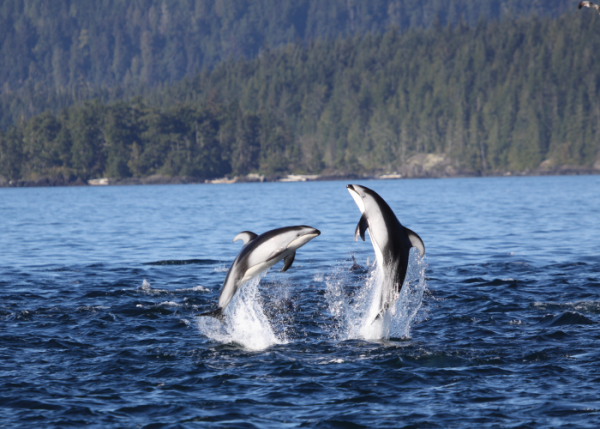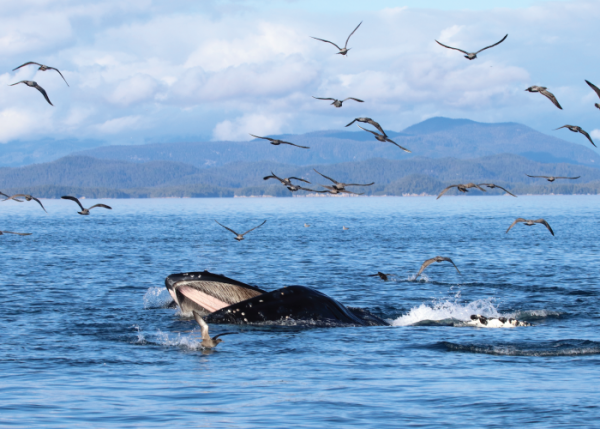Charity Spotlight: This blog post is part of our charity spotlight series and was provided by Rob Williams and Erin Ashe, Co-Founders of Oceans Research and Conservation Association, as part of our ongoing charity spotlight series.
Oceans Research and Conservation Association (ORCA)—best known for the projects conducted under our Oceans Initiative umbrella—is a team of scientists on a mission to protect marine wildlife in Canada and beyond. Like the whales we study, we are migratory. We divide our time between getting our feet wet in the field, wherever our work is needed, and using our science to inform smart decisions to conserve wildlife. Every day, we conduct innovative, trustworthy science on whales, dolphins, sharks, salmon, and seabirds, to help make conservation efforts affordable and effective.
On today’s World Oceans Day, however, we’re stepping out of our research lab to advocate on behalf of all species living in the depths of our oceans, and to make a case for nonprofit science research.
Humpback Whale Lunge Feeding
We need to guide the smart recovery of endangered species
The southern resident killer whales in the Salish Sea are critically endangered. Canada took a brave, precautionary stance to protect the whales’ critical habitat, and noted that the critical habitat wasn’t just a box on a map. It had to include the whales’ preferred prey, Chinook salmon, and an ocean quiet enough for the whales to find their fish. It sounds obvious, because sound is important to killer whales as vision is to us, but Canada was the first to include acoustics in a legal definition of critical habitat—this was a big win!
At ORCA, all of our work responds to a beautiful phrase in Canada’s Species At Risk Act, which requires Canadian decision-makers to use “best available information” when conserving Canadian species. With the help of our supporters, we have published some of the foundational work on the way noise affects killer whales and the quality of their critical habitat. We’ve also estimated how much Chinook salmon it takes to keep the southern resident killer whale population alive and thriving. Our research and work has helped to inform and assist agencies in their efforts to keep killer whale critical habitats clean, quiet and full of fish. For killer whales in Canada’s Pacific, the “best available information” is pretty great, and that is all due to hard work of government scientists, academics, non-profits and research facilities studying the species. Thanks to long-running studies by our colleagues in Canada’s Department of Fisheries and Oceans, and the Center for Whale Research, every killer whale in the southern resident population is known, named, and followed from birth to death. Because this critical information is available, we can work to guide the smart recovery of these endangered species.
“Our research and work has helped to inform and assist agencies in their efforts to keep killer whale critical habitats clean, quiet and full of fish.”
We need to ensure neglected species won’t fall through the cracks
While species like the killer whale are well researched, other species are not as lucky. Because of this, ORCA works to improve the quantity and quality of science available on other species, to make sure neglected species don’t fall through the cracks. We’ve pioneered affordable methods and partnered with Raincoast Conservation to estimate whether there are hundreds, thousands or tens of thousands of whales, dolphins or porpoise living along the British Columbia coast. We then use that information to try and level the playing field for poorly understood species. For example, Pacific white-sided dolphins haven’t been assessed in Canada for nearly 30 years. Our co-founder, Dr. Erin Ashe, earned a PhD studying Pacific white-sided dolphins, using low-cost, small-boat and non-invasive methods. Through Erin’s work, we know that the population appears stable, but they reproduce slowly. This means that if the population were to ever experience a catastrophe—a disease outbreak or an oil spill—the species may take decades to recover, given its slow reproduction.

Canada’s commitment to use of best available information is a mixed blessing. On the positive side, it helps ensure that decision-making is transparent and precautionary. All Canadians can weigh in on conservation decisions through the Species At Risk Act consultation process, and community stewardship is a key part of endangered species recovery. More importantly, Canada recognizes traditional ecological knowledge explicitly as an important way of knowing species. The weakness we see is in decision-making when rigorous scientific data are simply not available. Other countries mandate collecting the kind of data we collect, whereas Canada does not fund the routine collection of data to assess whether marine wildlife populations are going up or down. If we do detect a problem, Canada’s recovery planning can include it in precautionary conservation plans. But many problems could go undetected. This is taking on a new sense of urgency as the US introduces a rule requiring countries to prove that fisheries exporting seafood to US markets do not kill unsustainable numbers of marine mammals. The science we are talking about has conservation implications, but it is becoming important to maintain Canadian jobs and trade.
In our view, this is where nonprofit science can help. When Canadians support scientific research, we add to the body of knowledge constituting best available information. This, however, can only happen when Canadians support research conducted by nonprofits who are tirelessly working to care for the depths of our oceans. If the information is available, Canadian policy already ensures it is included in conservation efforts. We rely on a strong charitable sector to make that knowledge available to benefit our oceans, and the people whose livelihoods depend on a healthy ocean.
